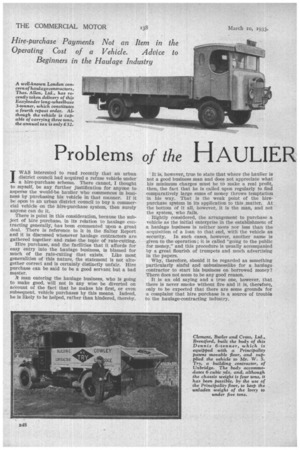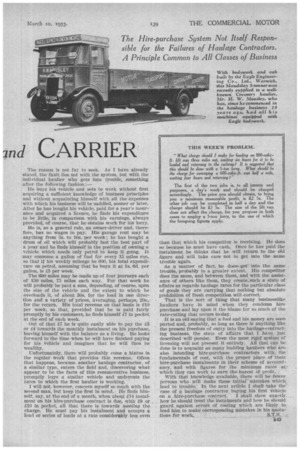Problems of the HAULIER 2nd CARRIER
Page 66

Page 67

If you've noticed an error in this article please click here to report it so we can fix it.
Hire-purchase Payments Not an Item in the Operating Cost of a Vehicle. Advice to Beginners in the Haulage Industry The Hire-purchase System Not Itself Responsible for the Failures of Haulage Contractors. A Principle Common to All Classes of Business
IWAS interested to read recently that an urban district council had acquired a refuse vehicle under a hire-purchase scheme. There cannot, I thought to myself, be any further justification for anyone to asperse the would-be haulier who commences in businesS by purchasing his vehicle in that manner. If it be open to an urban district council to buy a commercial vehicle on the hire-purchase system, then surely anyone can do it.
There is point in this consideration, because the subject of hire purchase, in its relation to haulage contracting generally, has been commented upon a great deal. There is reference to it in the Salter Report and it is discussed whenever haulage contractors are gathered together and raise the topic of rate-cutting.
Hire purchase, and the facilities that it affords for easy entry into the haulage business, is blamed for much of the rate-cutting that exists. Like most generalities of this nature, the statement is not altogether correct and is certainly distinctly unfair. Hire purchase can be said to be a good servant but a bad master.
X man entering the haulage business, who is going to make good, will not in any wise be diverted on account of the fact that he makes his first, or even subsequent, vehicle purchases by this means. Indeed, he is likely to be helped, rather than hindered, thereby. ' It is, however, true to state that where the haulier is not a good business man and does not appreciate what his minimum charges must be to make a real profit, then, the fact that he is called upon regularly to find comparatively large sums of money throws temptation in his way. That is the weak point of the hirepurchase system in its application to this ,matter. At the bottom of it all, however, it is the man, and not the system, who fails.
Rightly considered, the arrangement to purchase a vehicle as the initial enterprise in the establishment of a haulage business is neither more nor less than the acquisition of a loan to that end, with the vehicle as security. In such cases, however, another name is given to the operation; it is called "going to the public for money," and this procedure is usually accompanied by a great flourish of trumpets and much advertising in the papers. Why, therefore, should it be regarded as something particularly sinful and unbusinesslike for a haulage contractor to start his business on borrowed money? There does not seem to be any good reason.
It is an old saying and a true one, however, that there is never smoke without fire and it is, therefore, only to be expected that there are some grounds for a complaint that hire purchase is a source of trouble to the haulage-contracting industry. The reason is not far to seek. As I have already stated, the fault lies not with the system, but with the individual haulier who gets into trouble, something after the following fashion:— He buys his vehicle and sets to work without first acquiring a sufficient knowledge of business principles and without acquainting himself with all the expenses with which his business will be saddled, sooner or later. After he has bought his vehicle, paid for a year's insurance and acquired a licence, he finds his expenditure to be little, in comparison with his earnings, always provided, of course, that he obtains work for his lorry.
He is, as a general rule, an owner-driver and, therefore, has no wages to pay. His garage rent may be anything from 5s. to 10s. per week ; he has bought a drum of oil which will probably last the best part of a year and he finds himself in the position of owning a vehicle which needs only petrol to keep it going. It may consume a gallon of fuel for every 15 miles run, so that if his weekly mileage be 600, his total expenditure on petrol, assuming that he buys it at 1s. 6d. per gallon, is £3 per week.
The 600 miles may be made up of four journeys each of 150 miles, 75 miles each way. FOr that work he will probably be paid a sum, depending, of course, upon the size of the vehicle and the extent to which he overloads it, of about 30s. for the load in one direction and a variety of prices, Averaging. perhaps, 20s., for the return. His total revenue on that basis is £10 Per week, so that, provided that he is paid fairly promptly by his customers, he finds himself £7 in pocket at the end of each week.
Out of that £7 he is quite easily able to pay the £8 or £4 towards the monthly instalment on his purchase, leaving himself with the balance as a living. He looks forward to the time when he will have finished paying for his Vehicle and imagines that he will then be wealthy.
Unfortunately, there will probably come a hiatus in the regular work that provides this revenue.. Often that happens, because another haulage contractor, of a similar type, enters the field and, discovering what. appearto be the facts of this remunerative business, Promptly buys a similar vehicle and undercuts the rates to which the first haulier is working.
I will not, however, concern myself so much with the second man, but keep the first in mind. Fre finds himself, say, at the end of a month, when about .l4 instalment on his hire-purchase contract is due, with £9 or £10 in pocket, all that there is towards meeting the charge. He must pay his instalment and accepts a load or series of loads at a rate considerably less. even
than that which his competitor is receiving. He does so because he must have cash. Once he has paid the instalment he thinks that he will return to the old figure and will take care not to get into the same trouble again.
As a matter of fact, he does,,,get'. into the same trouble, probably to a greater extent, His competitor does the same, and between them, and with the assistance of others like them, they create :such a state of affairs as regards haulage rates for the particular class of goods they are carrying that nothing but absolute prohibition of fresh competition will correct.
That is the sort of thing that many businesslike hauliers have in mind when they condemn hire purchase and lay upon it the blame for so much of the rate-cutting that occurs to-day. •
It is an old saying that n.fool and his money are soon parted and, probably, so long as there is anythinglike the present freedom of entry into the haulage-contracting business, the state of affairs that I have just described will persist.Eventhe most rigid system of licensing will not prevent it entirely. All that can be done is to acquaint as many budding hauliers who aro also intending hire-purchase contractors with the • fundamentals of cost, with the proper phice of their hire-purchase instalments in their scheme of accountancy, and with figures for the minimum rates' at which they can work to earn the barest Of profit. .. With that knowledge available, -there will be -fewer persons who .3011 make these initialmistakes which: lead to trouble.' In the next article I shall -take the case of a haulage eontractor, buying his first vehicle
on a . hire-purchase contract. I shall show exactly bow he should treat the instalments and how he should guard. against errors of costing which are likely to lead him. to make corresponding Mistakes in his quota tions for work. S.T.II,






































































































